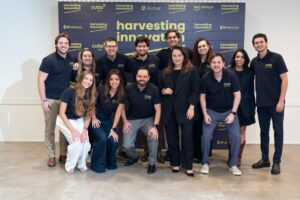When you think of New Zealand and agriculture, you are most likely to think of lush green pastures, efficient milk production, rolling vineyards, sheep, and possibly Lord of the Rings.
For a country where agriculture is such a dominant sector, it may come as a surprise that there has been little in the way of an agtech startup scene. Until now.
In an effort to take a leadership role in the field of agtech innovation, local business incubator, the BCC (Building Clever Companies), has launched an agtech accelerator program, Sprout Agritech.
“There has never really been a formalized startup scene in New Zealand,” say James Bell-Booth, Sprout program manager at BCC. “There has been so much focus on commodity products for export, but now things have changed, and more produce is coming into the market from the emerging world, New Zealand growers and producers need to look at how to add value, anywhere in supply chain.”
The 20-week program will formally launch on November 2 after eight startups are selected from the application process, which closes October 16. It will be delivered remotely so that entrepreneurs can stay in their hometowns in an effort to promote regional economies. But entrepreneurs will also be flown around the country for mentoring from business and technical experts.
Picking the program’s partners and investors has been one of BCC’s top priorities, according to Bell-Booth.
“We have tried to be clever with our partnerships,” he says. “We have not just partnered with investors, but with farming groups as well so that startups can get insights into what farmers want and a validation of their innovations.”
Sprout Agritech’s partners and investors include government tech agency Callaghan Innovation, Massey University, animal management tech company Gallagher Group, Livestock Improvement Corporation, a livestock genetics cooperative, New Zealand Trade and Enterprise, Sir Stephen Tindall’s venture fund K1W1, angel network Enterprise Angels and Manawatu Investment Group, another angel investment group.
Alignment between farmers and agtech entrepreneurs has been arguably amiss in the US causing some organizations, such as AgTech Insight and Western Growers’ Ag Innovation & Technology Center, to place an emphasis on connecting the two worlds. So BCC wanted to ensure they got it right from the beginning.
BCC is no stranger to agriculture technologies and has already helped incubate four globally focused startups including CropX, the smart irrigation company, which backed by big name agtech investors Finistere Ventures, GreenSoil Investments, and Innovation Endeavors, the VC firm founded by Google chairman Eric Schmidt.
The other three are BioLumic, a UV device company, CalfSMART, which is producing automated calf rearing tech, and Polybatics, a bioplastics tech company. Together the four startups have raised in excess of $15 million in growth capital from New Zealand and overseas investors.
The take up of technologies by farmers in New Zealand is a similar story to that in the US or other regions: there are some incredibly tech-savvy farmers keen to engage with new technologies, while others take a longer time to become comfortable with new innovations.
New Zealand has also suffered from less agtech penetration by US companies, according to Bell-Booth.
“New Zealand is a tiny market so we are not a priority for a lot of agtech companies. Plus our farming system is a bit different to many being mainly pasture-based, which means it’s not so easy for people to customize products for us. But that is why there is a great opportunity for us to incubate technologies out of the country.”
BCC will not stop at just the one accelerator: in stage two the incubator wants to build relationships with overseas accelerators and investors to give entrepreneurs easy access those markets.
To apply before October 16, register on the site.
Photo: Tukituki River and Te Mata Peak, Hawkes Bay, New Zealand, by Phillip Capper, on Flickr





